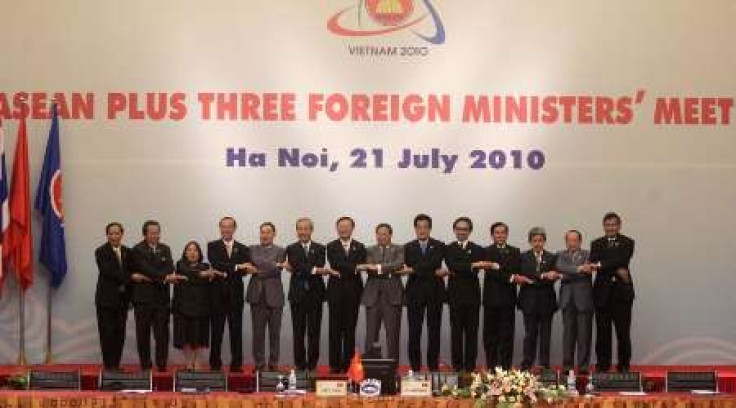South China Sea Dispute: Is China Becoming More Irritable?

China says the Philippines infringed its sovereignty on Wednesday by sending a delegation of politicians to a disputed island in the South China Sea.
Foreign Ministry spokesman Ma Zhaoxu said China had "indisputable sovereignty" over the island, in the Spratlys chain.
The spokesman comments came after a group of Philippine congressmen had flown to Pagasa Island on Wednesday and declared it Philippine territory.
The Spratly Islands are also claimed by Vietnam and Taiwan, and the dispute surrounding the Islands is part of a larger territorial row, which also involves Brunei and Malaysia.
In an attempt to prevent the situation from further spiralling out of control, the regional grouping ASEAN (Association of South East Asian Nations) met in Bali, where talks have focused on framing guidelines for resolving the dispute.
Tension has been growing this year, with China making a series of tough statements warning off Vietnam and the Philippines.
"China has indisputable sovereignty over the South China Sea islands and their surrounding waters," said Mr Ma.
"The move of the Philippine side seriously infringed China's territorial sovereignty."
The Philippine congressmen landed on Pagasa island, which is the only island in the Spratlys populated by Filipinos, and sang the national anthem with residents.
Pagasa, also known as Tithu island, lies about 480km (300 miles) west of the western Philippine province of Palawan.
It has an airstrip, a military base and a small town hall, and is occupied by no more than 60 civilians.
The Spratly Islands lie in an area thought to be rich in oil and gas. The region also has vital shipping routes.
More broadly however, the South China Sea is a 1.3 million square mile patch of the Pacific Ocean bracketed by China and several Southeast Asian nations.
The area is dotted with hundreds of largely uninhabited islands and coral atolls that are home to some of the world's most diverse marine life, however many insist that the states battling over the territory are more concerned with its potentially huge reserves of natural gas and oil.
A Chinese estimate suggests as much as 213 billion barrels of oil lie untapped in the South China Sea which, if true, would make it the largest oil reserve outside Saudi Arabia, according to the U.S. Energy Information Administration.
While China is now complaining about the Philippines' attitude, a series of incidents between Chinese and Vietnamese vessels in the sea has fuelled a growing rift between the communist neighbours, surprisingly resulting in Vietnam forming closer military ties with the U.S.
In late May, the Vietnamese Ministry of Defence reported that a Chinese patrol boat slashed a submerged cable of an oil and gas survey ship operated by PetroVietnam, the state energy firm and in June, the Vietnam's Foreign Ministry reported that a Chinese patrol boat cut cables from a Vietnamese ship doing seismic surveys off its southern coast.
Beijing, on the other hand, maintains that Vietnamese vessels have been illegally surveying in Chinese waters and harassing Chinese fishing boats.
The Philippines backed the Vietnamese allegations and also reported Chinese boats cutting cables of a survey ship on the western border of the South China Sea.
Defending itself, China claims both nations were exploring in disputed waters and that it is not to blame.
"If you want to know why there is tension in South China Sea, I think you have to go and ask the country or countries that have made all the provocations," Cui Lei, China's vice minister of the Foreign Ministry, told CNN in a rare interview last month.
According to China, the South Sea territories could be of a huge geopolitical importance as they might contain enough oil and gas to rival Saudi Arabia's reserves.
Recently however a report published by the U.S. Energy Information Administration insisted such claims have yet to be proven.
As all countries concern attempt to gather more information, oil and gas survey vessels have increasingly become the centre of the recent incidents.
The smaller nations in the region are feeling the pressure to stake their claims for oil and fishing rights, or risk losing them to a more assertive China, analysts says.
"There's a sense coastal states like Vietnam and the Philippines need to use the economic area more urgently, so they need to catch more fish now, they need to discover more oil now," said James Manicom, an expert on maritime disputes at the Balsillie School of International Affairs in Waterloo, Canada.
However, following the meeting in Bali, Chinese and Southeast Asian officials said they have agreed on a draft of guidelines to avert tension in the South China Sea.
China, which had until now resisted taking part in a code of conduct, changed its mind during a meeting with senior officials of the 10-member Association of Southeast Asian Nations, or ASEAN, in Bali, Indonesia, on Wednesday.
"This is an important milestone document on the cooperation among China and ASEAN countries," China's Assistant Foreign Minister Liu Zhenmin told reporters. "And we have a bright future and we are looking forward to future cooperation."
The document, "Guidelines on the Implementation of the Declaration on the Conduct of Parties in the South China Sea," will now have to be approved by the government of China and ASEAN countries.
While all sides called it a hopeful sign toward a peaceful resolution to the overlapping claims in the South China Sea, tensions among the different parties are still running high.
Among the goals of the guidelines, all sides engaged in promoting dialogue and identifying any project they undertake in the disputed region.
© Copyright IBTimes 2024. All rights reserved.





